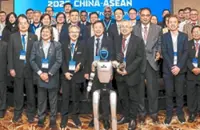Google asked Lemoine to talk to LaMDA to make sure it wasn’t using discriminatory or hateful language. — Machine learning vector created by vectorjuice - www.freepik.com
Don’t unplug your computer! Don’t throw away that smartphone! Just because a Google software engineer whose conclusions have been questioned says a computer program is sentient, meaning it can think and has feelings, doesn’t mean an attack of the cyborgs through your devices is imminent.
However, Blake Lemoine’s analysis should make us consider how little we have planned for a future where advances in robotics will increasingly change how we live. Already, automation has put thousands of Americans who lack higher-level skills out of a job.





